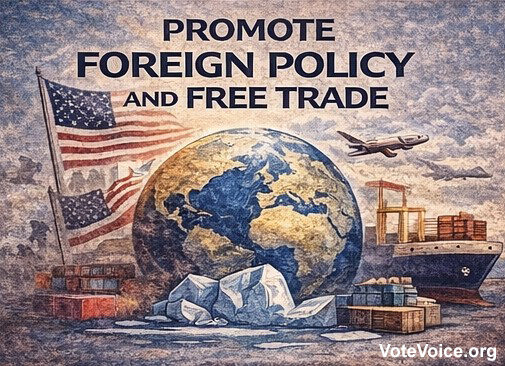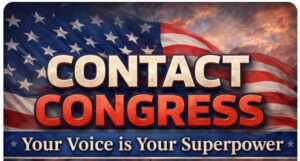Foreign Policy and Free Trade

Key Observations:
First: Trade drives American prosperity. It’s not just theory: it’s your job, your products, your daily life.
Second: Our closest allies are also our biggest customers. Canada, Mexico, the European Union, and Japan. These aren’t just political partners, they’re economic lifelines.
Third: Countries that embrace global trade grow faster. History proves it. Data confirms it.
Fourth: Economic engagement gives us geopolitical influence. When we trade, we shape global standards and values.
Fifth: Protectionism backfires. Tariffs and trade wars don’t protect American workers—they raise costs for families and businesses
Introduction:
America’s prosperity isn’t just about what we do within our borders, but how we engage with the world beyond them.
For decades, the United States has stood as a global leader. But that leadership is facing its greatest test. The question isn’t whether we should engage with the world. The question is: how do we engage in ways that strengthen American workers, protect our values, and secure our future?
Project 2026 provides a comprehensive vision for rebuilding American leadership through smart diplomacy and fair trade.
Below is Project RAD’s plan for Sensible Foreign Policy and Free Trade
📘Rebuild and Modernize U.S. Global Alliances
🎯 Objective:
Strengthen diplomatic alliances to promote global stability and shared democratic values.
✅ Key Actions:
-
Reaffirm Commitment to NATO and UN: Reinforce U.S. leadership and financial commitments to multilateral institutions.
-
Restore Diplomatic Corps: Reinvest in the State Department, increase staffing, and fill all ambassadorial positions with qualified professionals.
-
Expand Strategic Alliances: Strengthen ties with emerging democracies in Africa, Asia, and Latin America through political and economic cooperation.
-
Host a Global Democracy Summit: Convene allied nations to coordinate on human rights, election integrity, and anti-corruption policies.
-
Modernize Foreign Aid: Restore and align U.S. aid programs (especially USAID) with long-term development goals, not short-term politics.
📘 Promote Free, Fair, and Equitable Trade
🎯 Objective:
Foster open markets that benefit American workers, consumers, and allies.
✅ Key Actions:
-
Rejoin and Reform Trade Pacts: Return to trade agreements like the CPTPP (formerly TPP) with stronger labor and environmental standards.
-
End Unilateral Tariffs: Replace ad-hoc tariffs with consistent trade enforcement using WTO-compliant mechanisms.
-
Enforce Labor and Environmental Standards: Hold trading partners accountable to agreed-upon labor laws and climate standards in all deals.
-
Support Domestic Industries for Export Readiness: Fund programs to help small and medium-sized businesses access global markets.
-
Trade Adjustment Assistance: Expand support for U.S. workers displaced by trade through retraining and relocation programs.
📘 Restore U.S. Leadership on Global Challenges
🎯 Objective:
Lead international efforts to address climate change, health, technology, and conflict.
✅ Key Actions:
-
Climate Diplomacy: Re-engage fully in the Paris Climate Agreement and lead global emissions-cutting coalitions with enforceable goals.
-
Global Health Security: Strengthen partnerships with WHO and CDC equivalents worldwide to prepare for and contain pandemics.
-
Technology Alliances: Form coalitions with democratic countries to set global norms on AI, cybersecurity, and digital surveillance.
-
Global Peacekeeping and Conflict Prevention: Fund early-warning systems and peacekeeping missions to prevent crises before escalation.
📘 Balance National Security with Diplomacy
🎯 Objective:
Use diplomacy as the first tool of foreign policy, while maintaining a smart national defense.
✅ Key Actions:
-
Revive Nuclear Arms Agreements: Re-enter arms reduction talks with Russia and China to prevent proliferation.
-
Diplomacy with Adversaries: Engage in sustained, principled dialogue with nations like Iran, North Korea, and China to reduce tensions.
-
Limit Endless Military Engagements: Phase out indefinite troop deployments and redirect resources to diplomacy and soft power.
-
Prioritize Cybersecurity and Drone Technology in Defense Strategy: Increase joint defense programs with allies to defend against cyberattacks and digital warfare. Invest in Drone technology.
-
Reform the War Powers Act: Require Congressional approval for extended military action beyond 60 days.
📘 Integrate Economic Diplomacy with Domestic Priorities
🎯 Objective:
Ensure that foreign economic policy strengthens American jobs, innovation, and resilience.
✅ Key Actions:
-
Reshore Critical Supply Chains: Use trade policy to bring manufacturing of key products (e.g., semiconductors, PPE) back to the U.S. or allied nations.
-
Create a “Friend-Shoring” Strategy: Prioritize trade relationships with reliable partners to reduce dependence on authoritarian economies.
-
Green Trade Policies: Promote clean-energy industries through export incentives, green subsidies, and carbon border adjustments.
-
Bilateral Trade Councils: Establish standing trade councils with key partners (e.g., EU, India, Japan, Brazil) to address disputes and opportunities in real time.
-
Invest in Diplomatic Economic Training: Equip U.S. diplomats with deeper trade, tech, and financial expertise to advance U.S. economic interests abroad.
TAKE ACTION – Contact Congress
(How to contact Congress) click here
Congressional Committees That Oversee Foreign Policy and Free Trade
Foreign Policy
Senate Committee on Foreign Relations
-
The main foreign policy committee in the Senate.
-
Jurisdiction includes:
-
Treaties and diplomatic nominations (e.g., Ambassadors)
-
Foreign aid and sanctions
-
U.S. participation in international organizations
-
Oversight of the State Department and Foreign Service
-
🔑 This committee plays a central role in shaping U.S. international engagement.
House Committee on Foreign Affairs
-
Primary committee for foreign policy.
-
Jurisdiction includes:
-
Diplomatic relations
-
U.S. foreign aid and humanitarian assistance
-
International organizations (e.g., the UN)
-
Global human rights and security policy
-
Arms control and export policy
-
Subcommittees include:
-
Global Health, Global Human Rights, and International Organizations
-
Asia, the Pacific, Central Asia, and Nonproliferation
-
Europe, Energy, the Environment, and Cyber
Free Trade
Senate Committee on Finance
-
Senate counterpart to Ways and Means on trade matters.
-
Jurisdiction includes:
-
Tariffs, trade agreements, and trade enforcement
-
Oversight of the USTR and trade remedy laws
-
Trade provisions in tax and revenue bills
-
🔹 House Committee on Ways and Means
-
Primary committee for trade policy.
-
Jurisdiction includes:
-
Tariffs and customs
-
Free trade agreements (FTAs) (e.g., USMCA, WTO)
-
Trade Promotion Authority (TPA)
-
Oversight of U.S. Trade Representative (USTR)
-
Additional Committees with Overlapping Interests
| Chamber | Committee | Relevance |
|---|---|---|
| Both | Armed Services Committees (House & Senate) | Oversee military aspects of foreign policy and national security |
| Both | Intelligence Committees (House & Senate) | Oversight of foreign intelligence activities and global threats |
| Both | Appropriations Committees (State & Foreign Operations Subcommittees) | Funding for foreign aid, diplomacy, and international programs |


